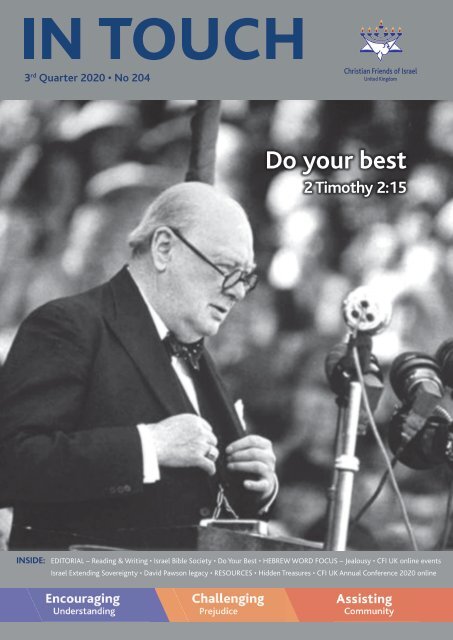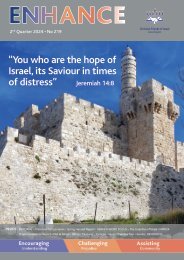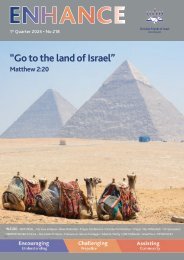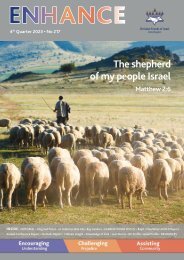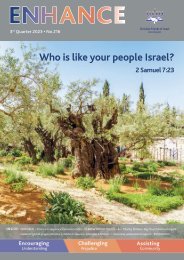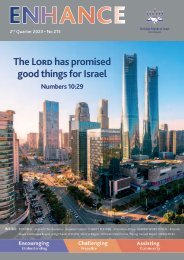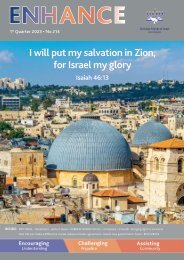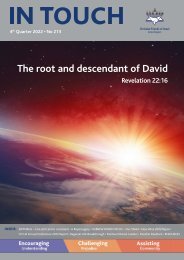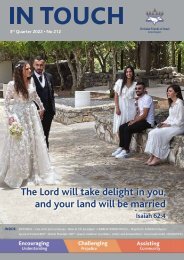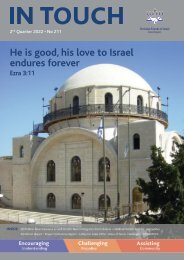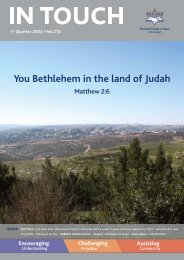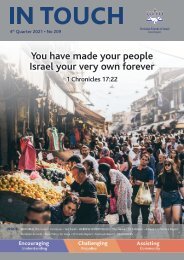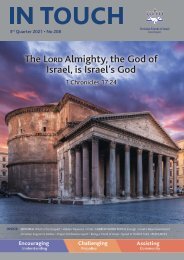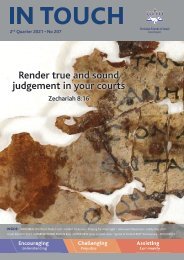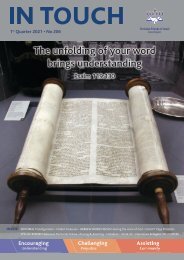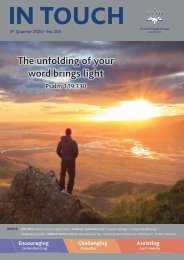In Touch - 3rd Quarter 2020
News on CFI during lockdown, an important study on the Hebrew word for 'jealousy', an article describing a Bible translation controversy, a summarised letter about sovereignty over the West Bank and some memories of David Pawson - Friend of Israel.
News on CFI during lockdown, an important study on the Hebrew word for 'jealousy', an article describing a Bible translation controversy, a summarised letter about sovereignty over the West Bank and some memories of David Pawson - Friend of Israel.
Create successful ePaper yourself
Turn your PDF publications into a flip-book with our unique Google optimized e-Paper software.
3 rd <strong>Quarter</strong> <strong>2020</strong> • No 204<br />
Christian Friends of Israel<br />
United Kingdom<br />
Do your best<br />
2 Timothy 2:15<br />
INSIDE: EDITORIAL – Reading & Writing • Israel Bible Society • Do Your Best • HEBREW WORD FOCUS – Jealousy • CFI UK online events<br />
Israel Extending Sovereignty • David Pawson legacy • RESOURCES • Hidden Treasures • CFI UK Annual Conference <strong>2020</strong> online
Christian Friends of Israel<br />
United Kingdom<br />
Editorial<br />
Jacob Vince<br />
Reading and<br />
writing<br />
About us<br />
CFI UK seeks to bless Israel by means<br />
of practical and moral support, and<br />
to serve the Church in teaching<br />
about God’s purposes for Israel and<br />
the Hebraic heritage of our faith.<br />
CFI UK also produces a monthly<br />
Prayer Letter, a weekly audio Middle<br />
East Report and distributes the<br />
Haverim teaching CDs.<br />
Please contact us for full details<br />
of projects in Israel and also the<br />
teaching resources available.<br />
As an educational charity, we carry<br />
a variety of resources relevant to<br />
our purpose. We do not necessarily<br />
endorse every view expressed by our<br />
guest writers or authors.<br />
IN TOUCH Magazine<br />
Published by:<br />
CFI Charitable Trust<br />
PO Box 2687<br />
Eastbourne<br />
BN22 7LZ<br />
Tel: 01323 410 810<br />
Email: info@cfi.org.uk<br />
www.cfi.org.uk<br />
Registered Charity<br />
No. 1101899<br />
Registered Office c/o<br />
Caladine, Chantry House<br />
22 Upperton Road<br />
Eastbourne, BN21 1BF<br />
Company No: 04984515<br />
VAT Registration No: GB678780275<br />
facebook.com/cfiuk<br />
twitter.com/cfi_uk<br />
youtube.com/cfiuk<br />
Front cover photo:<br />
Winston Churchill<br />
<strong>In</strong> previous editorials I have<br />
focused on the importance<br />
of God’s written word.<br />
Of course, if it is written then it’s<br />
expected that we read it. God’s<br />
written word can be read privately<br />
and publicly (1 Timothy 4:13).<br />
Examples of both personal and<br />
corporate reading, understanding<br />
and response can be found in all<br />
four parts of the bible. Here’s a few:<br />
<strong>In</strong> the LAW (Torah)<br />
Then he took the Book of the Covenant<br />
and read it to the people. They<br />
responded, ‘We will do everything the<br />
Lord has said; we will obey’<br />
(Exodus 24:7).<br />
When all Israel comes to appear before<br />
the Lord your God at the place he will<br />
choose, you shall read this law before<br />
them in their hearing<br />
(Deuteronomy 31:11).<br />
<strong>In</strong> the PROPHETS (Nevi’im)<br />
He [Josiah the king] went<br />
up to the temple of the Lord<br />
with the people of Judah, the<br />
inhabitants of Jerusalem, the<br />
priests and the prophets – all the people<br />
from the least to the greatest. He read<br />
in their hearing all the words of the<br />
Book of the Covenant, which had been<br />
found in the temple of the Lord<br />
(2 Kings 23:2).<br />
Look in the scroll of the Lord and read:<br />
None of these will be missing, not one<br />
will lack her mate. For it is his mouth<br />
that has given the order, and his Spirit<br />
will gather them together (Isaiah 34:16).<br />
<strong>In</strong> the PSALMS (Ketuvim)<br />
They read from the Book of the Law of<br />
God, making it clear and giving the<br />
meaning so that the people understood<br />
what was being read (Nehemiah 8:8).<br />
They stood where they were and read<br />
from the Book of the Law of the Lord<br />
their God for a quarter of the day, and<br />
spent another quarter in confession<br />
and in worshipping the Lord their God<br />
(Nehemiah 9:3).<br />
How do<br />
you<br />
read it?<br />
<strong>In</strong> the APOSTLES<br />
‘What is written in the Law?’ he<br />
[Jesus] replied. ‘How do you read it?’<br />
(Luke 10:26).<br />
Then Philip ran up to the chariot<br />
and heard the man reading Isaiah the<br />
prophet. ‘Do you understand what you<br />
are reading?’ Philip asked (Acts 8:30).<br />
Having the completed and<br />
authoritative written word, we are<br />
exhorted to handle it accurately<br />
(2 Timothy 2:15). The apostle<br />
Paul writes this to his companion<br />
and student Timothy, from the<br />
upcoming generation of the<br />
newly formed Church, into which<br />
community the fourth and final<br />
section of the Bible was being<br />
given. The apostle Peter refers to<br />
Paul’s letters as Scripture (2 Peter<br />
3:16). Ever since, we find ourselves<br />
in the place of Timothy.<br />
<strong>In</strong> this edition you will<br />
learn of the attempt to<br />
change the wording of the<br />
Bible in a new translation<br />
by a sub-group of the Danish<br />
Bible Society, through the Israel<br />
Bible Society’s response. This<br />
reminded me of a similar attempt<br />
in Nazi Germany to do the same,<br />
highlighted in Simon Ponsonby’s<br />
talk at our annual conference six<br />
years ago (CFI UK Resources: ‘Oh<br />
the Depth of the Riches’, page 11).<br />
We have over the past few months<br />
promoted several events online,<br />
including teaching sessions at<br />
Glyndley Manor, around the theme<br />
of the whole Bible, a part of which<br />
is reproduced in this edition. This is<br />
pertinent to our ongoing directive<br />
to ‘Do your best to present yourself to<br />
God as one approved ... who correctly<br />
handles the word of truth’ (2 Timothy<br />
2:15). May the Lord help us in<br />
this generation and succeeding<br />
generations to do our best.<br />
2 IN TOUCH • 3 rd <strong>Quarter</strong> <strong>2020</strong>
SPECIAL REPORT<br />
Danish Contemporary Bible <strong>2020</strong><br />
Bible Society Israel response<br />
By kind permission Victor Kallisher<br />
Bible Society Israel<br />
The Jerusalem Post recently published an article about a<br />
new contemporary translation of the Bible, produced by<br />
the Danish Bible Society. While new Bible translations<br />
are usually cause for celebration, this new contemporary<br />
Danish Bible is cause for serious concern.<br />
We appreciate and respect the staff and the ministry of the<br />
Danish Bible Society, and recognise them as our brothers<br />
and sisters in the Lord. They are a group of people very<br />
committed to making the Bible available and accessible to<br />
everyone, and have done so for many years.<br />
Our concern is strictly in regard to the translation itself.<br />
<strong>In</strong> the translation, called “Danish Contemporary Bible <strong>2020</strong>”<br />
the term “Israel” is almost completely removed from the<br />
New Testament, and is changed several times in the Old<br />
Testament. The Danish Bible Society did this project using<br />
their own budget and team and not under the supervision<br />
of the United Bible Societies. The Bible Society in Israel had<br />
no knowledge of the project prior to its publication.<br />
<strong>In</strong> this new Danish Bible the term “Israel” only appears<br />
twice in the entire New Testament, despite appearing more<br />
than 60 times in the Greek from which the New Testament<br />
is translated. The term “Israel” has been replaced with “the<br />
Jewish people”, “the Jews”, “the people”, and in some cases<br />
removed altogether.<br />
A press release of the Danish Bible Society says this<br />
translation decision was made because, “for the secular<br />
reader, who does not know the Bible well, ‘Israel’ could be<br />
referring only to a country. Therefore, the word ‘Israel’ in<br />
the Greek text has been translated in other ways, so that<br />
the reader understands it is referring to the Jewish people.”<br />
From our discussions with the Danish Bible Society, we<br />
understand that there was no political agenda behind this<br />
decision. The purpose was to engage a secular Danish<br />
audience with the word of God, and to make it personal to<br />
them.<br />
The local body of believers as well as others in Israel and<br />
beyond were very surprised by and disappointed with the<br />
approach that the translators took regarding the term Israel<br />
and in its implementation in this translation.<br />
We at the Bible Society in Israel have done some<br />
preliminary research regarding how the term “Israel” was<br />
translated throughout the new Danish Contemporary Bible<br />
<strong>2020</strong>, and were troubled by what we found. Following are a<br />
few examples where “Israel” has been replaced or removed.<br />
While all translators must make difficult decisions, those<br />
decisions must be freed, as much as humanly possible,<br />
from any interpretation foreign to the text. Even if done to<br />
accommodate a secular Danish audience, the meaning of<br />
the word of God must not be compromised.<br />
New Testament:<br />
• Matthew 2:21: “and he rose and took the child and his<br />
mother and went to the land of Israel.” ð “land of Israel” is<br />
changed to simply “home”.<br />
• Matthew 15:31: “God of Israel” ð “God”.<br />
• Luke 4:25: “many widows in Israel in the days of Elijah” ð<br />
“many Jewish widows in the time of Prophet Elijah.”<br />
• Luke 4:27: “many lepers in Israel” ð “many Jewish lepers”<br />
• John 1:49: “king of Israel” ð “king of all people”<br />
• 2 Corinthians 3:7: “the Israelites could not gaze at Moses’<br />
face.” ð “Moses’ face radiated so strongly that the Jews<br />
could not bear to see it.”<br />
The term “Israel” appears 2,521 times in the Hebrew Bible.<br />
<strong>In</strong> the new Danish Contemporary Bible <strong>2020</strong> it appears<br />
2,316 times. Below are several examples of the changes.<br />
Old Testament:<br />
• Exodus 24:10: “they saw the God of Israel.” ð “they saw<br />
God.”<br />
• Psalm 121:4: “He who watches over Israel” ð “He who<br />
takes care of us”<br />
• Isaiah 41:14: “Fear not, you worm Jacob, you men of<br />
Israel! I am the one who helps you, declares the Lord; your<br />
Redeemer is the Holy One of Israel.” ð “Jacob”, “Israel” and<br />
“The Holy One of Israel” have been replaced or removed.<br />
• Isaiah 43:1: “But now thus says the Lord, he who created<br />
you, O Jacob, he who formed you, O Israel ð “O Jacob” and<br />
“O Israel” have been removed.<br />
• Jeremiah 45:25: “Israel shall be justified” ð “Israel” replaced<br />
with “my people”<br />
• Jeremiah 49:3: “You are my servant, Israel” ð “Israel”<br />
changed to “my chosen”.<br />
• Jeremiah 25:27: “the Lord of hosts, the God of Israel” ð<br />
“the Lord of Heaven”<br />
• Jeremiah 33:7: “I will restore the fortunes of Judah and the<br />
fortunes of Israel” ð “Judah and Israel” changed to “all my<br />
people”.<br />
We believe that the replacing and removing of the<br />
term “Israel” in the way that it was done in the Danish<br />
Contemporary Bible <strong>2020</strong> was a harmful decision which has<br />
hurt many who love the word of God, in Israel and beyond.<br />
We believe that the Danish Bible Society, as our fellow<br />
brothers and sisters in the Lord, will seriously consider our<br />
feedback, which echoes the voices of many, and will take<br />
measures to correct their translation as necessary. Please<br />
pray with us that in all this, God will be glorified.<br />
3 rd <strong>Quarter</strong> <strong>2020</strong> • IN TOUCH 3
Feature<br />
Do your best<br />
Jacob Vince<br />
<strong>In</strong> his second personal letter, Paul instructs<br />
Timothy to, ‘Do your best to present yourself to<br />
God as one approved, a worker who does not need to<br />
be ashamed and who correctly handles the word of truth’<br />
(2 Timothy 2:15).<br />
Another word for correctly is accurately.<br />
If we take the example of numbers, just think what<br />
would happen if we did not use them accurately.<br />
Well, the Bible is far more important than numbers, so<br />
we need to make sure we handle it accurately.<br />
Neither is Paul asking Timothy something<br />
unreasonable. He simply asks him to do his best.<br />
Recently we remembered 75 years since the end of<br />
the Second World War. <strong>In</strong> his speech describing what<br />
he called Britain’s greatest day, the country’s leader<br />
Churchill said,<br />
“<strong>In</strong> all our long history we have never<br />
seen a greater day than this. Everyone<br />
man or woman has done their best”<br />
(Winston Churchill, 8 May 1945).<br />
It is within the grasp of everyone to<br />
do their best. To end the war, it was<br />
a combined effort toward victory.<br />
<strong>In</strong> the context of the Bible, we are<br />
asked to ‘do our best’ to handle it<br />
accurately.<br />
If we are encouraged to handle the<br />
Bible accurately, this must mean there<br />
is a temptation to handle it incorrectly or<br />
inaccurately.<br />
This is exactly what happens at the beginning of<br />
the Bible. God gives very clear instruction to Adam<br />
and Eve. They are granted the opportunity to eat<br />
of every tree in the garden apart from one, the tree<br />
of the knowledge of good and evil. God’s enemy<br />
immediately questions what God has said.<br />
“Did God really say?” (Genesis 3:1)<br />
Next, Eve repeats what God said but adds to it. She<br />
says God said that they were not able to eat of this one<br />
tree nor touch it. There is no record of God saying<br />
they should not touch it. The result is that Eve is<br />
deceived, ate of the fruit and gave some to Adam who<br />
also ate of it.<br />
<strong>In</strong> case we think Eve is responsible, Adam was there<br />
all along and didn’t intervene or take responsibility<br />
himself. Not only that, but he sought to place the<br />
blame on Eve, who in turn placed it on God’s enemy.<br />
<strong>In</strong> the event, both were held responsible and suffered<br />
the consequences firstly of doubting God’s word and<br />
then acting against it. This illustrates well for us and<br />
all humankind the importance of accurately handling<br />
the word of God. The rest, as they say, is history –<br />
literally!<br />
We all know the term manuscript for music, or script<br />
for a drama. <strong>In</strong> both instances musicians and actors<br />
need to handle it accurately to perform it properly.<br />
Paul describes the word of truth as Script-ure. Like a<br />
script in drama and a music manu-script, we need to<br />
get to know it, practice it and use it properly.<br />
Look at the status Paul gives the Bible-script or<br />
scripture. Paul writes,<br />
“All scripture is God-breathed and is useful for<br />
teaching, rebuking, correcting and training in<br />
righteousness, so the man of God may be<br />
thoroughly equipped for every good work”<br />
(2 Timothy 3:16-17)<br />
First scripture is introduced as<br />
God-breathed or in another word<br />
‘inspired’.<br />
Some people struggle to see God as<br />
three persons and at-one, but from<br />
the very start of the Bible, all three<br />
are there, at-one with themselves.<br />
There is God who speaks his word,<br />
Jesus who is God’s eternal word, and<br />
the Holy Spirit – the breath of God – all<br />
in perfect relationship.<br />
Having described scripture, the Bible, as ‘Godbreathed’,<br />
Paul writes that it is useful for four things,<br />
‘teaching, rebuking, correcting and training’, which seem<br />
to work well in that order.<br />
It first needs to be accurately taught, this in turn<br />
shows up faults which need recognising, then<br />
rebuked, next these faults need correcting. Finally,<br />
the corrections need to be trained into us.<br />
For over 2,000 years we have had the completed Bible,<br />
which is authoritative and our primary source. Over<br />
the years it has been misunderstood and mishandled.<br />
Our generation has the great privilege to do our best,<br />
in God’s strength to rectify this.<br />
We can all pray and play a part to this end, so that<br />
the message God wants to communicate to all, to and<br />
through both Israel and the Church, in word and<br />
deed, becomes a reality today.<br />
4 IN TOUCH • 3 rd <strong>Quarter</strong> <strong>2020</strong>
Hebrew Word Focus<br />
Melissa Briggs MA<br />
Hebrew University of Jerusalem<br />
Melissa is an experienced Hebrew<br />
teacher with a desire to make the<br />
rich language of the Scriptures<br />
accessible to Christians.<br />
Visit: www.explorehebrew.co.uk<br />
Jealousy<br />
“I am my beloved’s, and<br />
his desire is toward me”<br />
(Song of Songs 7:10)<br />
קַ נָ א<br />
Qanna<br />
Why do we often push back against the<br />
very thing that we long for most?<br />
If the Creator of the universe offers us<br />
perfect love, acceptance, guidance, security, worth,<br />
provision, forgiveness and fellowship in a dynamic,<br />
fulfilling relationship, then why do so many of us take<br />
up his offer half-heartedly? Or not at all?<br />
The Lord is indeed the “pearl of great price” for whom<br />
we should be willing to trade all else (see Matthew<br />
13:45-46). The Hebrew word that describes God’s<br />
קַ qanna, נָ א desire for our full attention and affection is<br />
usually translated as ‘jealous’.<br />
Qanna only ever refers to the Lord’s righteous<br />
jealousy. One Hebrew lexicon explains: “It is used of<br />
God as not bearing any rival; the severe avenger of<br />
departure from himself.” Other words from the same<br />
family include:<br />
- zeal, jealously, great passion (can refer to<br />
man’s jealousy or God’s), and<br />
Qannah נָא -קָ the jealousy, zealousness or envy of man<br />
(usually negative)<br />
However, the modern word ‘jealous’ does not<br />
do justice to the true meaning of qanna. To our<br />
English-speaking ears, ‘jealousy’ sounds controlling,<br />
immature, suspicious, offensive, petty, selfish and offputting.<br />
But none of these describe God’s wonderful,<br />
holy, perfect character.<br />
Qanna means God is zealous and committed to us in<br />
the most honourable way and with the most noble of<br />
intentions. He is motivated by the purest, most loyal<br />
and passionate love. He loves us collectively as the<br />
bride of Messiah, but also individually. He is willing<br />
to fight valiantly for us and defend us heroically.<br />
God’s qanna is the intersection of the ardour, wrath<br />
and protection of a God who requests to be obeyed,<br />
respected and adored (for our good and his glory).<br />
God’s qanna is a blessing to us, not a burden. True joy<br />
comes when we give him our full devotion and trust.<br />
We may push back against this, thinking that the ideal<br />
would be to have ‘a little’ of God and ‘a little’ of the<br />
world. But everyone has to choose either to enjoy the<br />
beautiful protection of God’s qanna or experience its<br />
furious wrath.<br />
“Do not worship any other god, for the Lord, whose name is<br />
Qanna, is a qanna God” (Exodus 34:14).<br />
Thankfully God did not leave us to attain his high<br />
standards of faithfulness on our own. He punished<br />
his own Son on our behalf, in his holy and fierce<br />
qanna, in order to atone for all our sins and idolatry<br />
(which he views as acts of spiritual adultery).<br />
We can never achieve a right relationship with God by<br />
קִ נְ אָ ה Qinah<br />
our own efforts – the bar of holiness is too high. But it<br />
is available to us freely by grace through faith in Jesus<br />
(see Joshua 24:19, Ephesians 2:8-9 and Romans 5:8).<br />
Does the Lord have his rightful place of priority,<br />
intimacy and fidelity in our hearts? Do we relate to<br />
him from a distance, or as the beloved Bride – his<br />
chosen delight? Almighty God is not to be placed<br />
alongside other ‘idols’ or have our attention just one<br />
day per week. “For the Lord your God is a consuming<br />
fire, even a qanna God” (Deuteronomy 4:24).<br />
Any husband would be rightly jealous if his wife had<br />
other lovers. It would be very strange if a husband<br />
did not burn with jealousy towards the infidelity of<br />
a wayward wife! Read Hosea to see the essence of<br />
God’s qanna illustrated in a painful marriage.<br />
God allows circumstances that prove to us the<br />
undependable nature of our idols (see Hosea 2). This<br />
is not out of malice, vindictiveness or pettiness. God<br />
knows that no one can care for us as he does (see<br />
Romans 8:32 and Isaiah 64:4). He knows that giving<br />
our time, attention and ‘worship’ to idols (even<br />
‘good’ things) will bring us heartache, trouble and<br />
destruction (see Isaiah 42:8).<br />
When God has his rightful place, as our first love,<br />
the pressure is lifted from other aspects of our life to<br />
define, fulfil, or validate us. We can properly enjoy<br />
our friends, marriages, families, vocations, holidays,<br />
hobbies, homes, etc. for what they are, when we do<br />
not look for them to be more than God intended.<br />
Why would such a wholehearted, passionate, perfect<br />
husband accept anything less than a wholehearted,<br />
passionate bride? There is no room for the halfhearted!<br />
The Lord is Qanna and he has qanna towards<br />
you, his beloved, echoing words from Songs of Songs,<br />
“Place me like a seal over your heart,<br />
like a seal on your arm;<br />
for love is as strong as death,<br />
its jealousy unyielding as the grave.<br />
It burns like blazing fire,<br />
like a mighty flame.<br />
Many waters cannot quench love;<br />
rivers cannot sweep it away.<br />
If one were to give<br />
all the wealth of one’s house for love,<br />
it would be utterly scorned.”<br />
(Songs of Songs 8:6-7)<br />
If you are interested in learning the Hebrew language through online tuition (or in person if<br />
you are local to Berkshire), or if you are interested in hosting a Hebrew language day for a<br />
group in your area, please contact Melissa for more details at: hebrew.explore@gmail.com<br />
or at: www.explorehebrew.co.uk<br />
3 rd <strong>Quarter</strong> <strong>2020</strong> • IN TOUCH 5
Events Review<br />
Our online events during the lockdown...<br />
ZOOM TEACHING<br />
“Trust in the Lord<br />
with all your heart<br />
and lean not on your<br />
own understanding”<br />
by Jacob Vince<br />
Four Glyndley Talks:<br />
The importance of accurately handling<br />
the Bible. Big picture Bible story - its<br />
structure. Eye-witness testimony and<br />
Covenant theme over-arching the<br />
whole Bible.<br />
Proverbs 3:5–6<br />
GLYNDLEY MANOR<br />
COVENANT STEPS<br />
“Hi Jacob, thank you for this, the<br />
team enjoyed your teaching on the<br />
biblical foundations and learnt a<br />
great deal.”<br />
Shown<br />
MAY <strong>2020</strong><br />
WHY THE JEWS FILM<br />
Promoted & Shown MAY <strong>2020</strong><br />
Modesty may be a virtue but the stats don’t<br />
lie: 22% of all Nobel prizes have been won<br />
by Jews, and don’t get us started on Jewish<br />
accomplishments in literature, film and art.<br />
This fascinating documentary turns to Jewish<br />
luminaries, including Howard Jacobson, Shimon<br />
Peres, Alan Dershowitz and Lord Jonathan Sacks, to<br />
find out the reasons for Jewish achievement.<br />
Alan Aziz CEO, Technion UK<br />
WZO UK & ZF:<br />
BRINGING ISRAEL CLOSER TO HOME<br />
What it’s like to be a Christian in<br />
the Holy Land – Shown JUNE <strong>2020</strong><br />
Speaker: Shadi Khalloul<br />
Chaired by: Jacob Vince CFI UK<br />
Over 170 registered to view. Excellent comments received.<br />
“He is an amazing speaker! What a wonderfully warm man.<br />
Thanks Jacob – you were great.”<br />
“Thank you so much!! I’ve always wondered in statistics<br />
who they meant by Christians, and assumed Arab, but now I<br />
understand better. Shalom!! :)”.<br />
Podcasts<br />
David Soakell’s Lite Bites recorded for Podcast and<br />
now on CFI UK’s YouTube channel<br />
6 IN TOUCH • 3 rd <strong>Quarter</strong> <strong>2020</strong>
Viewing now on YouTube...<br />
Annexation or Restoration videos<br />
Now showing on YouTube<br />
There has been much debate relating to the issue of Israel’s plan to extend<br />
sovereignty over parts of Judea and Samaria. With this in mind, CFI UK have<br />
created a video series that examines the questions at the centre of the dispute<br />
regarding ownership of the land to the west of the Jordan river. All three videos<br />
are now available on CFI’s YouTube channel.<br />
CFI UK Annual Conference goes online<br />
Coming up<br />
Coming soon CFI UK’s<br />
annual conference <strong>2020</strong><br />
Due to the current restrictions on gathering the speakers for the CFI UK Annual Conference are<br />
producing their teaching as short videos that will be launched online in September <strong>2020</strong>.<br />
With slight adjustments to the programme our speakers are preparing professional quality video<br />
versions of their topics, please see back page for more details.<br />
NEW PROGRAMME<br />
FRIDAY 4 th SEPTEMBER<br />
Understanding Israel Biblically<br />
Mark Durie<br />
Challenges Israel Faces<br />
Mark Durie<br />
SATURDAY 5 th SEPTEMBER<br />
Israel & Church Today<br />
Mark Durie<br />
The Next Generation<br />
Clive & Jane Urquhart<br />
Revd Dr Mark Durie<br />
Clive & Jane Urquhart<br />
twitter.com/cfi_uk<br />
facebook.com/cfiuk<br />
youtube.com/cfiuk<br />
3 rd <strong>Quarter</strong> <strong>2020</strong> • IN TOUCH 7
SPECIAL FEATURE<br />
Israel Extending Sovereignty<br />
The following is a summary of the letter sent to Crispin Blunt MP responding to his<br />
letter to Prime Minister Boris Johnson over the Israeli proposals in the ‘West Bank’.<br />
Dear Mr Blunt,<br />
Israel extending Sovereignty in parts of ‘the West Bank’<br />
We are responding to the letter that you and a number of Members of the House of Commons and the House of Lords sent<br />
to the Prime Minister and Foreign Secretary on 1st May <strong>2020</strong>. We challenge the assertion that extending sovereignty by the<br />
State of Israel over Jewish communities in Judea and Samaria (aka ‘the West Bank’), and indeed any Jewish presence there, is a<br />
violation of international law. Like so many who deny Israel’s rights in Jerusalem, Judea and Samaria, you start the clock in 1967,<br />
and the prior history and recognition of legal rights are ignored.<br />
The San Remo Resolution<br />
The legal right of the Jewish people to re-constitute their historic homeland was recognised at the San Remo Conference of<br />
1920 and by virtue of the Mandate for Palestine that resulted from it. This was unanimously endorsed by all 51 nations that<br />
were in the League of Nations, which then constituted the entire international community. <strong>In</strong>ternational Lawyer Dr Cynthia D<br />
Wallace writes: “The Mandate system had been set up under Article 22 of the Covenant of the newly formed League of Nations.<br />
At San Remo, the Mandate for Palestine was entrusted to Great Britain as a ‘sacred trust of civilization’, and the language of the<br />
Balfour Declaration was enshrined in both the San Remo Resolution and the League Mandate, which stand on their own as valid<br />
international legal instruments with the full force of treaty law.”<br />
Territorially the legal right of the Arabs to self-determination was accorded to them by the Mandates for Syria and Lebanon<br />
(under the French), and Mesopotamia – now Iraq – (under the British), and later in Transjordan, which was originally part of the<br />
Mandate for Palestine.<br />
The Legal Obligations of The Mandate for Palestine<br />
The Mandate document legally obligated Britain, as the Mandatory Power, to work with the Jewish Agency to create suitable<br />
conditions for the Jewish National Home and to encourage Jewish immigration and close settlement of the land with the view<br />
to ultimate self-government (i.e. statehood). While the civil and religious rights of the existing non-Jewish population were to<br />
be protected, the political rights of self-determination were reserved for the Jewish people.<br />
The 1939 White Paper<br />
Basically, due to Arab insurgency under the leadership of the Mufti of Jerusalem, the radical Islamist Haj Amin Al-Husseini,<br />
Britain failed to carry out its legal obligations. The 1939 White Paper severely restricted Jewish immigration at a time when<br />
millions in Europe were desperate to flee from the Nazis. The British policy in the 1939 White Paper stated that the total Jewish<br />
population of Palestine must not exceed one third, which would make the Jewish National Home ungovernable by the Jews,<br />
despite having been legally granted the political rights of self-government.<br />
The Permanent Mandates Commission of the League of Nations deemed the 1939 White Paper to be a violation of the<br />
Mandate, and in the House of Commons Winston Churchill spoke vehemently against the majority Conservative government’s<br />
policy. <strong>In</strong>stead of being able to find refuge in their National Home, many of the Jews in Europe were slaughtered by the Nazis.<br />
There is no doubt that the British policy has left the blood of at least hundreds of thousands of Jews on our hands.<br />
The Rights given in the Mandates enshrined in the UN Charter<br />
The rights of the beneficiaries of all the League of Nations Mandates were carried over into Article 80 of the United Nations<br />
founding Charter. Dr Wallace explains: “Article 80 of the UN Charter assumes the powers given to the League of Nations, so that<br />
anything that was decided under the League of Nations is still legally binding under the UN Charter.”<br />
The Atlee-Bevin government became opposed to the whole concept of there ever being a Jewish state, and actively opposed it –<br />
in other words a complete betrayal of the Mandate. A rigorous naval blockade of Palestine was used to stop Jewish survivors of<br />
the Holocaust from reaching their ancestral homeland.<br />
The 1947 Partition Plan<br />
The 1947 Partition Plan – UNGA Resolution 181 – is often seen as sanctioning the legal right of the Palestinian Arabs to a state<br />
west of the Jordan River. UN General Assembly Resolutions are not legally binding, they are no more than recommendations.<br />
The Arab rejection of Resolution 181 effectively rendered it null and void.<br />
Acquisition of Territory through War<br />
<strong>In</strong>ternational law is crystal clear about prohibiting the acquisition of territory through war. This applies to the Arab invasion of<br />
the newborn State of Israel on 15th May 1948. The Arab Legion was led by a serving British Army General, Sir John Bagot Glubb<br />
(aka ‘Glubb Pasha’). One would presume that, as a senior serving British Army Officer, he would have been under orders from<br />
Whitehall. <strong>In</strong> leading this illegal invasion, Britain itself was arguably in breach of Article 2 of the UN Charter. Moreover, the<br />
Jordanians ‘ethnically cleansed’ its conquered territory of its Jewish population, which today is considered a war crime.<br />
<strong>In</strong>ternational lawyer, Andrew Tucker says: “Jordan, Syria, Egypt had no claim to Jerusalem or ‘the West Bank’ – on the basis of any<br />
doctrinal principle of international law.”<br />
Jordan’s subsequent annexation of its conquered territory was only recognised by Britain, Pakistan and Iraq. The United Nations<br />
never recognised Jordan’s sovereignty over the territory it renamed as ‘the West Bank’. Neither did the Arab League. Quite<br />
simply, as a result of a ‘war of aggression’, it was illegal under the UN Charter, which is treaty law.<br />
8 IN TOUCH • 3 rd <strong>Quarter</strong> <strong>2020</strong>
The Six-Day War and Resolution 242<br />
<strong>In</strong> 1967 Israel regained the territory that was originally mandated to be part of the Jewish homeland in a defensive war that was<br />
intended to exterminate the Jewish state. Again, the Arab attack was illegal.<br />
You mention UNSC 242. Israel has sought peace with all the surrounding Arab states. Resolution 242 does not demand that<br />
Israel retreat from all the territory that it took control of in the Six-Day War. It calls for all parties to be able to live “in peace in<br />
secure and recognised boundaries.” It was deliberately worded that way because the UN Security Council then recognised that<br />
the 1949 Armistice Lines, which are not recognised borders in international law, were not secure. Since then Israel has entered<br />
into a peace treaty with both Egypt and Jordan, and handed back about 90% of the territory it gained in 1967.<br />
Resolution 242 and the Palestinians<br />
At the time of Resolution 242, the people today known as ‘the Palestinians’ were not considered part of the problem. <strong>In</strong> 1988<br />
Jordan renounced its territorial claim to Jerusalem and ‘the West Bank’ in favour of ‘the Palestinians’. Because Jordan had<br />
acquired the territory illegally Jordan had no legal power of disposition to pass it on to a third party. What Jordan did was a<br />
violation of the international law principle of ex injuria jus non oritur – i.e. illegal acts cannot create law. There is no doubt that<br />
in international law the State of Israel has the superior claim of sovereignty over ‘the West Bank’ and all of Jerusalem.<br />
UN Security Council Resolution 2334<br />
According to the UN Charter, only resolutions under Chapter VII are legally binding. UNSC Resolution 2334 is a Chapter VI<br />
resolution. The UN is not a legislative body; it is a political body. UN resolutions express the opinions and political will of the<br />
nations that vote for them, and have no force in law.<br />
‘Oslo’<br />
There is no principle of international law that would require the creation of a Palestinian state. What international law does<br />
require is that they are entitled to self-determination. The Palestinians were offered that through the ‘Oslo’ peace process which<br />
they have squandered. Had they concluded the Final Status Negotiations with Israel they would now have a state. Time and<br />
again they have been offered a state, the last time being in 2008 when they were offered nearly all of ‘the West Bank’, and even<br />
the Old City of Jerusalem, in return for the end of the conflict. Again they turned it down. The truth of the matter is that the<br />
Palestinian leadership want the destruction of Israel more than they want their own state.<br />
The Trump Peace Plan<br />
With his ‘deal of the century’ President Trump has called the Palestinian bluff, and offered a generous financial package if they are<br />
prepared to live in peace beside the Jewish state. The British government should be supporting this peace process. By imposing<br />
sanctions on Israel we will merely embolden the Palestinian Authority to continue its incitement to hatred and terrorism against<br />
Israel. Those who will suffer the most are the Palestinian people themselves.<br />
Yours sincerely,<br />
Hugh Kitson, Colonel Richard Kemp CBE, Marquess of Reading<br />
<strong>In</strong>spired by the Book<br />
[ With thanks to Robin Foster for<br />
identifying this passage]<br />
<strong>In</strong> his book ‘The World in Crisis 1911-1914’ Winston Churchill wrote the<br />
following upon his appointment to First Lord of the Admiralty.<br />
That night when I went to bed, I saw a large Bible lying on a table in my bedroom.<br />
My mind was dominated by the news I had received of the complete change in my<br />
station and of the task entrusted to me. I thought of the ‘peril’ of Britain, peace loving,<br />
unthinking, little prepared, of her power and virtue, and of her mission of good sense<br />
and fair play. I thought of mighty Germany, towering up in the splendour of her Imperial State and delving<br />
down in her profound, cold, patient, ruthless calculations. I thought of the army corps I had watched tramp<br />
past, wave after wave of valiant manhood, at the Breslau manoeuvres in 1907; of the thousands of strong horses<br />
dragging cannon and great howitzers up the ridges and along the roads around Wurzburg in 1910. I thought of<br />
their education and thoroughness and all that their triumphs in science and philosophy implied. I thought of the<br />
sudden and successful wars by which her power had been set up. I opened the Book at random, and in the 9 th<br />
chapter of Deuteronomy I read:<br />
Hear, O Israel: You are now about to cross the Jordan to go in and dispossess nations greater and stronger than you, with<br />
large cities that have walls up to the sky. The people are strong and tall—Anakites! You know about them and have heard<br />
it said: “Who can stand up against the Anakites?” But be assured today that the Lord your God is the one who goes across<br />
ahead of you like a devouring fire. He will destroy them; he will subdue them before you. And you will drive them out and<br />
annihilate them quickly, as the Lord has promised you. After the Lord your God has driven them out before you, do not<br />
say to yourself, “The Lord has brought me here to take possession of this land because of my righteousness.” No, it is on<br />
account of the wickedness of these nations that the Lord is going to drive them out before you, to accomplish what he swore<br />
to your fathers, to Abraham, Isaac and Jacob. (Deuteronomy 9:1-5). It seemed a message full of reassurance.<br />
3 rd <strong>Quarter</strong> <strong>2020</strong> • IN TOUCH 9
LEGACY<br />
David Pawson<br />
Friend of Israel<br />
By Robin Lane<br />
On the evening of 21 st May I<br />
heard of David Pawson’s<br />
passing to glory at the age<br />
of 90. Alongside the sadness of<br />
another much-loved Bible teacher<br />
leaving us, memories started<br />
flooding back of David’s teaching<br />
and the great help it has been to<br />
me, as well as to very many others.<br />
I had the privilege of working at<br />
Anchor Recordings for some years<br />
and thus had ready access to much<br />
of David’s teaching, which had<br />
been faithfully recorded in his<br />
churches and at conferences.<br />
A highlight for me was attending<br />
his one-day seminar titled ‘A<br />
Preacher’s Legacy’ in October<br />
2010 – when he was 80 years<br />
old. He led us through several<br />
sessions on exegesis of scriptures<br />
and sermon preparation, and then<br />
completed the day by preaching an<br />
evangelistic sermon. His passion<br />
for preaching was still so strong<br />
that when he finished the sermon<br />
his audience rose spontaneously<br />
to give him a standing ovation. It<br />
was a very special occasion.<br />
As well as being an enthusiastic<br />
Bible teacher and preacher, David<br />
was a friend of Israel. <strong>In</strong> his<br />
memoirs he admits that at first<br />
he travelled there just to see the<br />
land of the Bible. But in 1967 he<br />
“sat glued to the television screen”<br />
throughout the Six-Day War and<br />
started to gain more of an interest<br />
in the people. That interest started<br />
to emerge in his ongoing Bible<br />
teaching.<br />
<strong>In</strong> 2008 he wrote and published a<br />
book titled ‘Defending Christian<br />
Zionism’ responding to Stephen<br />
Sizer and John Stott who had<br />
written against Christian Zionism.<br />
David believed that Christians<br />
need a very clear understanding<br />
of the Bible to gain a correct<br />
perspective on the conflict in the<br />
Middle East.<br />
Perhaps his most important<br />
work on the topic is the book<br />
‘Israel in the New Testament’.<br />
He developed that text over a<br />
long period as he was invited<br />
to the ICEJ Feast of Tabernacles<br />
celebrations in Jerusalem year after<br />
year to teach on the subject.<br />
David was our main guest<br />
speaker at the Christian Friends<br />
of Israel UK Annual Conference<br />
held in Eastbourne in September<br />
2016. People warmed to him<br />
immediately when he expressed<br />
his delight at being able to teach<br />
us from the Bible at the age of 86,<br />
despite having cancer “all over<br />
his body.” He taught with great<br />
clarity and authority, first focusing<br />
on ‘The Five Crucial Covenants’<br />
among the whole set in the Bible.<br />
David Pawson speaking on the five crucial<br />
covenants in the Bible in 2016<br />
David spent just over an hour<br />
taking us through the Noahic,<br />
Abrahamic, Mosaic, Davidic and<br />
Messianic covenants.<br />
He described the party involved,<br />
the promise included, any proviso<br />
made, any penalty associated, the<br />
relevant duration and, finally, the<br />
divine purpose.<br />
<strong>In</strong> his second message, ‘Israel and<br />
the New Covenant,’ he noted that<br />
Jesus was sent to the Jews, that the<br />
New Covenant is Jewish, that the<br />
Jews were the first to benefit from<br />
it, and that the disciples were not<br />
in error when they asked Jesus<br />
about restoring the kingdom.<br />
Many of the Jews at the time<br />
rejected the New Covenant, but<br />
they will eventually benefit from<br />
it. David looked forward to the<br />
day when Jews and Christians are<br />
one flock, one new man in Christ<br />
Jesus, and live together in the new<br />
Jerusalem.<br />
David will be greatly missed, but<br />
his teaching will live on in video,<br />
audio and written form.<br />
Praise the Lord!<br />
ISRAEL AND THE NEW COVENANT<br />
David Pawson & Werner Oder<br />
Set of 3 audio CDs from the 2016 CFI UK Annual<br />
Conference.<br />
Disk 1 - David Pawson:<br />
The Five Crucial Covenants<br />
Disk 2 - Werner Oder:<br />
It Is for Freedom that Christ Has Set You Free<br />
Disk 3 - David Pawson:<br />
Israel and the New Covenant<br />
CDS131 // 3 CD set, approx 180 minutes // £10.00 (incl. UK p&p)<br />
ISRAEL IN THE NEW TESTAMENT<br />
David Pawson<br />
This exciting study reveals that both the<br />
people and the place called ‘Israel’ have a<br />
significant role in God’s future plans for<br />
world redemption. It’s a simple matter of<br />
faith in God’s faithfulness.<br />
Six books of the New Testament, now<br />
including Galatians, are used here to<br />
illustrate this important truth.<br />
B393 // 220 pages // £11.50 (incl. UK p&p)<br />
10 IN TOUCH • 3 rd <strong>Quarter</strong> <strong>2020</strong>
Resources www.cfi.org.uk/shop.php<br />
Postal savings on multiple items<br />
RUTH: UNCOVERING HIDDEN TREASURES – Mo Tizzard<br />
Mo takes her readers on an exciting journey through the verses of Ruth to show us how this Old Testament book<br />
links so clearly to the New Testament gospel and to our lives today. She uncovers the meaning behind many of the<br />
Hebrew words and discovers hidden treasures in the history, the genealogies, the laws and the customs of the day.<br />
This book reveals how together, a Gentile, a Jew and their Redeemer paint a wonderful picture of the Father’s plan<br />
of salvation.<br />
B509 // 169 Pages // £9.50 (incl. UK p&p)<br />
ISRAEL AND THE NATIONS – Pauline Shone<br />
Pauline explores God’s promises, purposes, and plans for Israel, concisely covering the biblical and historical record<br />
of the Jewish relationship to God and the land (from Abraham to today) along with some spiritual insights. Her<br />
resource-based approach to this historical and spiritual account is very pertinent and vital to today’s current events.<br />
B510 // 143 pages // £11.50 (incl. UK p&p)<br />
for resources call: 01323 410 810<br />
HILARIOUS HEBREW – Yael Breuer & Eyal Shavit<br />
Hilarious Hebrew is a book to help you memorise Hebrew words in a fun and fast way, with no tedious repetition.<br />
The method used works wonderfully for anyone, whether they consider themselves good at learning a foreign<br />
language or not. All you need to do is read the carefully constructed sentences, enjoy the illustrations or simply<br />
imagine the situations described in the sentences. You will be amazed at your ability to remember the new words!<br />
B508 // 224 Pages // £11.50 (incl. UK p&p)<br />
OH THE DEPTHS OF THE RICHES – Simon Ponsonby & Martin Charlesworth<br />
Set of 4 audio CDs from the 2014 CFI UK Annual Conference.<br />
Disc 1 - Simon Ponsonby: The Tragedy of Church History and the Jewish People<br />
Disc 2 - Simon Ponsonby: The Significance of the Jewishness of Jesus<br />
Disc 3 - Martin Charlesworth: A Biblical Overview of Israel and the Church<br />
Disc 4 - Martin Charlesworth: Communicating a Positive Understanding of Israel Today<br />
CDS127 // 4 CD set, approx 214 minutes // was £16.00 now £9.00 (incl. UK p&p)<br />
HOW WE GOT THE WORD OF GOD – (DVD) Presented by Peter Darg<br />
Walk with us through the Land of the Bible on this fascinating journey where you will learn how the Scriptures were<br />
written, preserved, codified and published.<br />
Beautifully filmed and produced in the Land of the Bible by the Bible Society in Israel, this educational video<br />
describes the history of writing the Bible, the best-selling book in the world.<br />
With Hebrew subtitles (which occasionally obscure the English)<br />
Produced by the Bible Society in Israel<br />
D153 // DVD 25 minutes // £9.00 (incl. UK p&p)<br />
UNLOCKING THE BIBLE<br />
David Pawson<br />
From Creation to Second Coming,<br />
via the rise of Israel, Jesus’ life,<br />
death, resurrection and the early<br />
church, Unlocking the Bible<br />
provides a real sense of the whole<br />
sweep of biblical history, culture<br />
and spiritual background, with<br />
implications for our lives today.<br />
B198 // 1343 pages // £15.00 (incl. UK p&p)<br />
BY GOD, I WILL - The Biblical Covenants<br />
David Pawson<br />
Teachers and preachers using the same Bible<br />
come up with many different interpretations and<br />
applications of God’s word. One of the reasons is<br />
their handling of the word ‘covenant’, which is so<br />
fundamental to scripture. The two key questions<br />
are: how many covenants has God made, and how<br />
many apply to Christians today?<br />
B482 // 107 pages // £9.00 (incl. UK p&p)<br />
3 rd <strong>Quarter</strong> <strong>2020</strong> • IN TOUCH 11
Don’t despise small beginnings for the Lord rejoices to see the work begin (Zechariah 4:10)<br />
What seems small to you might be huge to someone else.<br />
“We must read our<br />
Bibles like men digging<br />
for hidden treasure.”<br />
– J.C. Ryle<br />
Bohn Fawkes was a B17 pilot<br />
in WW2 when on one mission<br />
he sustained flak from Nazi<br />
anti-aircraft guns. Even though<br />
his fuel tanks were hit, the plane<br />
did not explode, and Fawkes<br />
was able to land the plane. The<br />
following morning Fawkes<br />
asked his commanding officer<br />
for the German shell. He wanted to keep it as a souvenir.<br />
He was told that not just one but eleven shells had been<br />
found in the fuel tank, none had exploded!<br />
When the technicians opened the missiles they found<br />
they didn’t contain explosive charges. They were clean<br />
and harmless, all except one was empty. This exception<br />
contained a carefully rolled piece of paper. On it a<br />
message had been scrawled in the Czech language.<br />
Translated, the note read: “This is all we can do for you<br />
now – using Jewish slave labour is never a good idea”!<br />
A courageous assembly line worker was disarming bombs<br />
and scribbling the note. He couldn’t end the war, but<br />
he could do something. And he did. God can do big<br />
things with small actions. Just like he did with a towering<br />
giant. Small stones looked futile to topple Goliath. The<br />
widow’s mite seemed nothing compared to the tithes of<br />
the wealthy, but God sees it all, including the motive of<br />
the heart, and Jesus used them in his day to inspire us in<br />
ours. Often people ask can any good come from such a<br />
catastrophic act of hate, such as seen in the Holocaust, but<br />
those lost in its embers still hold a legacy of hope to spur<br />
us on to make small changes and sow seeds of hope for<br />
Israel and the Jewish people even now.<br />
Guest Speakers<br />
Revd Dr Mark Durie<br />
Clive & Jane Urquhart<br />
Online Resources<br />
Christian Friends of Israel<br />
United Kingdom<br />
Join us ONLINE for this exciting event as we explore together God’s<br />
unfolding plan for Israel and the Church, seeking our Lord’s help to<br />
see more clearly.<br />
Understanding Israel Biblically<br />
There are few subjects on which Christians are so divided<br />
as the status of Israel, both today and in the future. <strong>In</strong> this<br />
presentation Mark offers a concise summary of biblical support<br />
for the restoration of Israel as a land and nation. The focus is on<br />
equipping Christians to communicate this message to others.<br />
Challenges Israel Faces<br />
The military challenge faced by Israel is well known and<br />
proven through repeated warfare. This presentation explores<br />
the spiritual roots of hatred directed against the Jews and<br />
against Israel, both by its neighbours, and by ideologies and<br />
nations outside the Middle East. It also notes implications of<br />
the increasing fracturing of the Islamic Middle East for Israel’s<br />
security.<br />
Israel & Church Today<br />
This presentation explores reasons why some Christians do<br />
not accept the legitimacy of Israel. After noting the important<br />
role of Christians in the founding of modern Israel, and the<br />
continued strategic contribution of Christians to Israel’s security,<br />
a warning is offered concerning consequences for the church<br />
when it rejects and refuses to share in God’s passion for Israel.<br />
Israel - The Next Generation<br />
What is our right response to Israel as individuals, church and<br />
nation? Building on the contribution at Balfour 100 celebration<br />
of the younger generation, the focus of this session is the<br />
upcoming generation, looking at how their understanding can<br />
and is being enhanced through contemporary communication.<br />
CFI UK online<br />
Annual Conference <strong>2020</strong><br />
REVISED ONLINE PROGRAMME<br />
FRIDAY 4 th SEPTEMBER<br />
6:45pm Opening song<br />
7:00pm<br />
7:45pm<br />
8:00pm<br />
Understanding Israel Biblically<br />
Mark Durie<br />
Coffee Break<br />
Challenges Israel Faces<br />
Mark Durie<br />
SATURDAY 5 th SEPTEMBER<br />
9:45am Opening song<br />
10:00am Israel & Church Today<br />
Mark Durie<br />
10:45am Coffee Break<br />
11:00am The Next Generation<br />
Clive & Jane Urquhart<br />
11:45am Closing song<br />
There will be an opportunity to give online to the<br />
work of CFI UK during the event. Thank you.<br />
NB. all timings are approximate.<br />
Christian Friends of Israel UK have online resources please visit: www.cfi.org.uk/shop.php<br />
Contact: CFI Communications, PO Box 2687, Eastbourne, BN22 7LZ<br />
Tel: 01323 410810 Email: info@cfi.org.uk YouTube: www.youtube.com/CFIUK Web: www.cfi.org.uk


